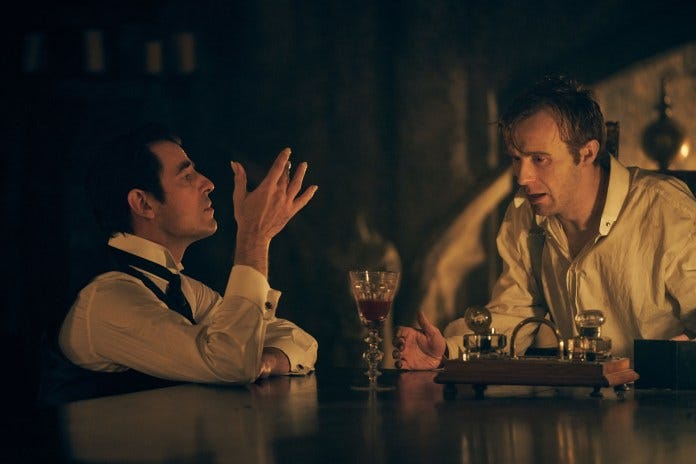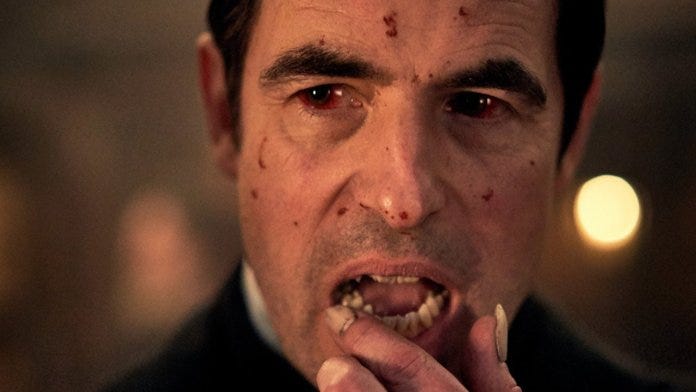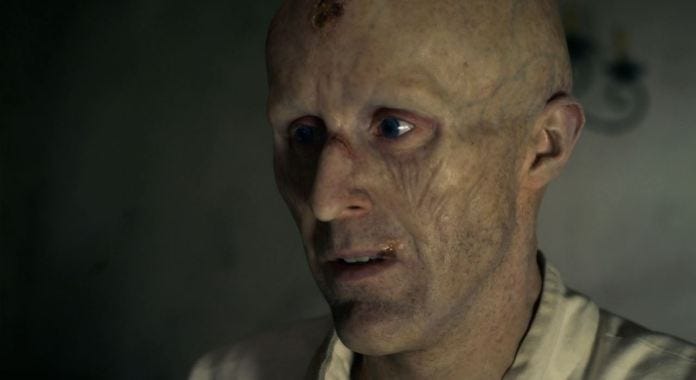Dracula Sticks to the Rules | Recap
Dracula | Season 1 | Episode 1 | “The Rules of the Beast” | Aired January 4, 2019
It's becoming harder and harder to tell what counts as a Netflix Original Series. Obviously the Netflix original programming, like Stranger Things or Lost in Space counts. But what about other series, whose status is harder to quantify? For example, the phenomenal Docu-series The Staircase, which ran for 10 episodes before Netflix bought it. Or the recent smash hit You, whose entire first season ran on Lifetime before Netflix bought it and distributed the same content on their platform under their branding. The practice feels parasitic. As if the streaming platform is taking from other networks in order to make themselves stronger. Which brings us to the most recent quote-un-quote Netflix Original Series: Dracula.
Mark Gatiss and Steven Moffat, the creative team behind BBC's hit Sherlock, developed Dracula for BBC. The producers insisted that, like Sherlock, their series would rely on inspiration from the source material without being fully dependant on it. Whatsmore, the duo insisted that Dracula would come across as more heroic in their version of the story.
And, also like Sherlock, the series is presented as a three-episode season, where each episode is the equivalent of a short feature film. Then there's the obvious parallel that Gattis and Moffat have, once again, decided to adapt a work of late 19th Century British literature. But judging from the first episode alone, that is about where the similarities between the two series end. Because while the team's previous show was a quick-witted reworking of a well-known series of adventure series, "The Rules of the Beast" is almost a step-by-step adaptation of the first part of Bram Stroker's novel.
Castle Dracula
The episode opens with Jonathan Harker (John Heffernan) in a convent, after his escape from Castle Dracula. Over the course of a full ninety minutes, the narrative alternates between Harker and the nuns in the present, and his experiences in Castle Dracula in the past. It's a clever story-telling device that shows fidelity to the epistolary format of the original novel. There is even a wink to the novels when Sister Agatha (Dolly Wells) asks that Harker include anything that he may have left out of his writings.
But the tease is ultimately disappointing. Most of the additional material that Gattis and Moffat drum up for their version of Jonathan Harker trapped in Castle Dracula is dull and administrative. Hidden maps, secret passages, and rigid feeding rituals would be fiendishly exciting in the right context. But they fall flat when the audience is stuck in a sort of limbo, constantly waiting for the episode to actually begin.
Truth be told, Moffat and Gattis feel constrained by the strick narrative which has begun every retelling of Dracula. The expectation that the Sherlock team will bring new energy and spice things up takes a very competent first episode and leaves it feeling dull. The highlight of the episode is, by far, what happens at the convent after Harker escapes Castle Dracula. Here, the showrunners have more freedom — as these events are never specifically addressed in the novel. And the duo is able to ply their trade as interesting writers who can turn expectations on their head. It's a promising hint at what's ahead for the rest of the series. But, unfortunately, it isn't enough to save this episode.
The Count and the Cloyster
The big hits in the first episode are the two actors who will be at the heart of the series. The obvious first one is Claes Bang who plays Count Dracula. While largely unknown by American audiences, Bang has been developing quite the reputation for himself across Europe. And he's showing off his acting chops here in a big way. His transition from the old, withered, Dracula to the young rejuvenated one feels genuine. He avoids caricature, even as he becomes dramatically younger (and more English) from scene to scene. His character isn't just authentically Dracula. It is authentically this Dracula. As he spends more time with Harker, he becomes more like Harker. And Bang finds a way to take one of Moffat and Gattis' most interesting storytelling choices, and make it believable.
On the other side of the battle is Dolly Wells who, as mentioned above, plays Sister Agatha. Although, in accordance with Dracula mythos, it would be more accurate to refer to her as Van Helsing. Moffat and Gattis have gender-swapped Van Helsing and cast her as a Dutch nun living in Hungary. And while that may seem a far cry from the character's original role as a doctor/lawyer/teacher living in London, I'd argue it's also a more logical profession for someone dedicated to the destruction of cosmic evil.
Wells and Bang only have one scene together, but their chemistry is brilliant and leaves me looking forward to more from the duo. Most of the episode switches off each of them opposite Heffernan. When they finally come together, it's a riveting final showdown. Bang's Dracula walks right up to the line labelled "over the top" but refuses to cross it. Meanwhile, Wells' Van Helsing is so analytical that she reads as interested but unimpressed. Their dynamic is, hands down, the best part of the episode. Possibly because it is what the writers are most interested in. And Possibly because of the overwhelming skill of the actors involved. Either way, it left me interested to find out more.
What Pretty Good Music They Make
If the first episode of Dracula suffers from anything, it is probably high expectations. A well-known story, a well known creative team, and two outlets known for high quality will do that to you. Taking the show on its merits, it is actually pretty enjoyable. If it suffers, it only suffers compared to the expectations audiences bring to it. And one episode is hardly the time to write something off for not being what you wanted. Even if it is a 90-minute episode.
Which is where my final recommendation for Dracula comes in. The one thing I would implore audiences to do is to make Dracula last. There is a temptation to take the whole thing like an Irishman style shot to the brain. That is not how to enjoy this show. The show was produced as a miniseries for BBC. The fact that it has ended up on Netflix with the "Original" branding on it is a trap. Do not fall for it. Enjoy each of the three super-sized episodes on their own, over three viewing experiences. Maybe with a nice drink in your hand. Wine perhaps? Or maybe something else...
All three episodes of Dracula are available now to stream on Netflix.




